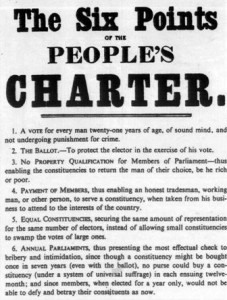 Defeated on the politics of marriage, and retreating from family values to the safer battle-ground of religious accommodation, the “Religious Right” is not faring well in America’s culture wars. It is tempting for Ulster-men to shrug our shoulders and dismiss this as none of our concern. While we defend the sanctity of life and marriage at Saints and Sceptics, we also believe that Christians should have liberty of conscience on most social and economic issues. We do not endorse politicians on this site, so we are not inclined to lament their defeats.
Defeated on the politics of marriage, and retreating from family values to the safer battle-ground of religious accommodation, the “Religious Right” is not faring well in America’s culture wars. It is tempting for Ulster-men to shrug our shoulders and dismiss this as none of our concern. While we defend the sanctity of life and marriage at Saints and Sceptics, we also believe that Christians should have liberty of conscience on most social and economic issues. We do not endorse politicians on this site, so we are not inclined to lament their defeats.
 But the humiliation of the movement formerly known as the “Moral Majority” has tempted some to think that secularism is on the side of history. Conservative jeremiads create the impression that secularization is inevitable and that secularism is progressive. Nothing could be further from the truth. Secularization is stumbling; while modernity was meant to lead to the death of religion, across the globe orthodox religion is thriving. In the academy religious scholars are as accomplished as their secular peers. While the “non-religious” grow in numbers, and the virulently atheist grow more strident, Christianity is not only viable but vibrant.
But the humiliation of the movement formerly known as the “Moral Majority” has tempted some to think that secularism is on the side of history. Conservative jeremiads create the impression that secularization is inevitable and that secularism is progressive. Nothing could be further from the truth. Secularization is stumbling; while modernity was meant to lead to the death of religion, across the globe orthodox religion is thriving. In the academy religious scholars are as accomplished as their secular peers. While the “non-religious” grow in numbers, and the virulently atheist grow more strident, Christianity is not only viable but vibrant.
Nor should anyone be fooled into thinking that secularism provides a reliable road to progress. There was a time, not so long ago, when many evangelicals were proud progressives, struggling to build a post-millennial city on a hill and pressing for far reaching social reforms. And, frankly, it is doubtful that secular humanism can provide rational grounds for its progressive ambitions.
Take the very idea of progress. This implies that human society should strive towards some ideal state of affairs. Indeed, progressives argue that we should do so with some urgency. It is not merely good to eliminate economic inequality and social exclusion: we have a moral duty to do so. Moreover, the very idea of social progress suggests a telos, a design, by which human beings should be guided. This all sounds very much like a providential plan.
Progressivism suggests that history should move in a particular direction. But, if secular humanism is true, who could prescribe a course with sufficient authority? As popular as Corbyn and Sanders are with the young, we doubt that their pronouncements will ever match the appeal of selfish capitalism. Secularism has tended towards a cult of expertise and an “exclusive humanism” which would bar any hint of religious morality from the public square. But academic and social elites have lost their authority. They may have a vision of an ideal society, but their track record is less than impressive.
 So secular humanism presents progressives with an authority problem. Worse, there is no point in lamenting inequality when sceptics lack good reason to believe in equality. As Donald Trump is so fond of reminding us, no two humans are equal in intelligence, wit, beauty, athletic ability or entrepreneurial acumen. The empirical evidence simply does not support the notion of equal human dignity. Each person has a different role in his society so different responsibilities weigh on him: every member of a population carries a different burden than her neighbour. Surely, as a matter of empirical fact, some people are worth more than others?
So secular humanism presents progressives with an authority problem. Worse, there is no point in lamenting inequality when sceptics lack good reason to believe in equality. As Donald Trump is so fond of reminding us, no two humans are equal in intelligence, wit, beauty, athletic ability or entrepreneurial acumen. The empirical evidence simply does not support the notion of equal human dignity. Each person has a different role in his society so different responsibilities weigh on him: every member of a population carries a different burden than her neighbour. Surely, as a matter of empirical fact, some people are worth more than others?
Not if every person is equally dependent on and responsible to a loving God. Christians believe that the creator of the Cosmos values us, made us to be like him, and can enter into a relationship with us. If every person is made in God’s image then everyone has great value because everyone is valued by God. But Christians have more to say, for at this point it becomes clear that even the doctrine of sin is both politically and socially liberating.
 According to the Christian scriptures no-one is righteous: all have sinned and fallen short of God’s glory. Christ died and rose again for every human being without exception and God commands everyone, everywhere to repent. Text after text clobbers the reader with the consequences. Human pride is impossible; we dare not judge others because one day we also will be judged. No-one should do anything out of selfish ambition or conceit, but each in humility should consider others more important than themselves.
According to the Christian scriptures no-one is righteous: all have sinned and fallen short of God’s glory. Christ died and rose again for every human being without exception and God commands everyone, everywhere to repent. Text after text clobbers the reader with the consequences. Human pride is impossible; we dare not judge others because one day we also will be judged. No-one should do anything out of selfish ambition or conceit, but each in humility should consider others more important than themselves.
So no-one who takes the biblical doctrine of sin seriously can look down on his “inferiors” or up to his “betters”. No one human is worth more than any other if Jesus died for all. Elitism is impossible if we are obliged to show mercy as we have been shown mercy. No one can merit salvation through their own good deeds, so God does not respect anyone’s social status or achievements. No class or creed, no race or profession, can consider itself superior to another. Indeed, the meek and the poor are more likely to enter God’s kingdom because they are less likely to boast in their merits and are more likely to depend on him like little children.
Scripture makes pride and boasting are impossible, and insists that no person is good enough to have absolute power over another. It also gives us hope to labour without counting the cost. The problems of man may be man-made, but it does not follow that man can unmake them or will even want to. Enlightened self-interest and political realism frequently present impassible obstacles. Too often the wicked prosper while the honourable few go unnoticed and unsung.
 But our struggle is not only with social establishments and political machines. More often than not, the better angels of our nature receive an almighty thumping from the demons of pride, sloth and lust. And it seems irrational to search for a city which has not been built with human hands. But if God suffered to found a Kingdom, and calls us to share its values with others, then we do not labour in vain. Even our failures have a tremendous nobility if our efforts please God.
But our struggle is not only with social establishments and political machines. More often than not, the better angels of our nature receive an almighty thumping from the demons of pride, sloth and lust. And it seems irrational to search for a city which has not been built with human hands. But if God suffered to found a Kingdom, and calls us to share its values with others, then we do not labour in vain. Even our failures have a tremendous nobility if our efforts please God.
Our world is wounded; whether we call it progress or reform, we must struggle to heal it. We are not endorsing every project associated with progressives; different writers on this site hold different opinions on the way to achieve peace and justice; moreover, we are unreconstructed traditionalists on issues of life, family and religious liberty. We are simply saying that everyone will have strength to row towards the sunrise when we believe that its creator has set our destination and is deeply invested in our progress.
